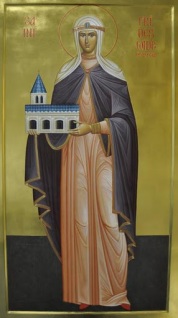Today is the feast of St Fridewide, patron and probably foundress of Oxford.
The following account of her, slightly adapted, and the two images are copied from Pilgrim-WordPress.com:

Image from St George Orthodox Information Service
St. Frideswide, Oct. 19; translation,
Feb. 12 (FREDESWEND, FREDESWYTHA, FRITHESWITHA, FRITHESWOED, etc.; in
French, FREVISE, FREWISSE). c. 650-735. Patron of Oxford and of Bomy, in
Artois. Represented with the pastoral staff of an abbess, a fountain
springing up near her, an ox at her feet.
Born at Oxford, which was then in the kingdom of Mercia. Her pious parents, Didan and Safrida, committed her to the care of a holy woman named Algiva. After her mother’s death, she returned to live with her father. He built a church at the gates of Oxford, and there she took the veil with twelve young women of her acquaintance. Didan then built them a convent near the church, and they lived there, not bound by the rules of the cloister, but by holy charity and love of seclusion. Algar, prince of Mercia, sent to ask Frideswide to marry him, as she was beautiful and very rich. She excused herself on the plea of her vow of celibacy. He persisted, and at last made a plan to carry her off. She fled to the river, and finding a boat, floated to Benton, about ten miles from Oxford. She took up her abode in a deserted hut used to shelter the swine that fed on the acorns in the forest. Here a fountain sprang up at her prayer. She remained concealed for about three years, while Algar tried to find her, at one time threatening to burn the city of Oxford unless she were given up to him. At last he discovered her hiding-place, and vowed to sacrifice her not only to his own brutality, but to that of his men. Just as she was about to fall into his hands, and was so worn out with fatigue and starvation that her last strength was forsaking her, she bethought her of the great saints who in the days of the early Church had saved their honour at the price of life; she invoked SS. Catherine and Cecilia. Immediately her persecutor was struck blind, and she was unmolested. She restored sight to her enemy on his repentance. She returned to Oxford, and there collected round her it number of Saxon maidens, over whom she presided in great holiness until her death in 735.
Many miracles are told of her in her
life, and after her death. One of the former is that a leper conjured
her in the name of Christ to kiss him, and she, overcoming her fear of
infection and natural disgust at his loathsome condition, made the sign
of the cross and kissed him. Immediately the scales fell from him, and
his flesh came again like that of a child. Multitudes of pilgrims
resorted to her tomb, the chapel on the site of the pigs hut, and the
fountain which had sprung up at her prayer, and which soon became famous
for miraculous cures. In 1180 her body was solemnly taken up from the
obscure part of the church where it was buried, and translated to the
chief place in the church, in presence of a great concourse of nobles,
prelates, and people. For centuries no king of England would enter
Oxford for fear of being struck blind. Henry III. was the first to
disregard the tradition, and there were not wanting persons who
attributed all his misfortunes to his presumption. Many kings, however,
gave munificent offerings to the churches and schools of Oxford. The
first school known with certainty to have existed in the sanctuary of
St. Frideswide has become one of the most famous centres of literary and
intellectual life in the world. Her monastery is now Christ
Church college, and her church, rebuilt in the 12th
century, is the cathedral. One version of her story says that she
lived, died, and was buried at Thornbury, now Binsey, and that her body
was translated thence to Oxford in the 12th century.
At Bomy, near Therouanne, in Artois,
there is a tradition that she fled thither from the pursuit of Algar,
and a fountain, said to have sprung up at her desire, is resorted to for
cures and other answers to prayer. Notwithstanding these discrepancies
in the accounts, and the fact that Bede, who was living during her
reputed period, does not mention her, critics agree that her story is
true in the main.
Image from frideswide.org – not attributed.
After Mass at the Oxford Oratory this evening, at which the fine music for the propers was provided by the female Frideswide Voices, we concluded with Benediction of the Blessed Sacrament and sang, as is our custom, a hymn in her honour. I have reproduced the text of this truly wondrous composition, which came to us from Christ Church, in my post Hymn to St Frideswide from this day in 2011.
The icon reproduced at the head of this post can be purchased online if you search for it.


No comments:
Post a Comment